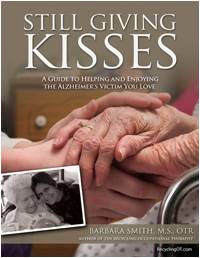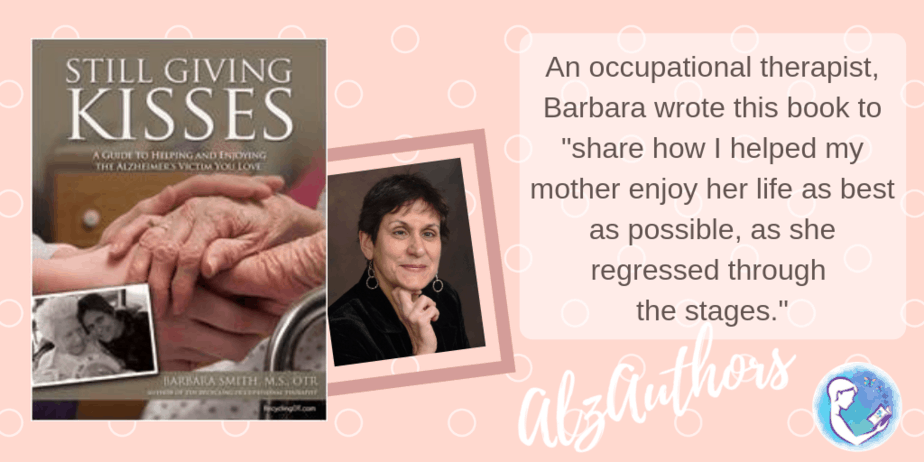 By Barbara Smith
By Barbara Smith
I am an occupational therapist, specializing in developmental disabilities. I had never planned to work in the area of geriatrics. But when my mother developed Alzheimer’s disease, I was thrust into the world of home care, Medicare, assisted living and nursing homes. I read numerous books and learned the lingo of lawyers, the health care bureaucracy and gerontology.
Fortunately, as an occupational therapist, I have years of experience adapting environments and creating activities to promote functional skills and quality of life. I wrote this book to share how I helped my mother enjoy her life as best as possible, as she regressed through the stages.
I could not help but notice that the residents in my mom’s assisted living and then her nursing home had few visitors. I believe that there are many reasons for this, but common ones are:
- Friends and loved ones are scared and confused about the person’s decline
- Friends and family do not know how to relate to a person who may no longer speak or seem to recognize them.
- And most sadly, friends and family think that the person has so little awareness that their presence is of no value.
My primary goal in writing Still Giving Kisses: Helping and Enjoying the Alzheimer’s Victim You Love was to offer an alternative to the above situations. Like many others, I was in the “sandwich generation.” My son was a tween and teen during these years and had many developmental and social challenges related to autism. The time crunch from work and family obligations naturally made spending time with my mom difficult–as I’m sure is true for millions of other caregivers. However, when loved ones learn how to help and actually enjoy being with this person, the relationship takes on a beautiful and mutually beneficial meaning. Given the right information and support, family and friends can learn how to spend quality time with a loved one that will create positive memories.
The title of this book reflects one of the few remaining motor acts my mother was able to perform during the last few months of her life. When she was no longer speaking, non-ambulatory and unable to eat independently, she was still able to pucker up her lips to communicate “I love you, come over for my kiss.” This was a highly significant motor act, one that symbolizes a continuing connectedness between myself and the Alzheimer’s victim I loved.
There are many books on the market that describe the symptoms and stages of Alzheimer’s disease and behavioral interventions that promote function. Often this information is dry and overwhelming. There are also many highly readable memoirs that give the spouse, adult-children or the victim’s point of view. In writing, Still Giving Kisses, I strove to provide both.
You will read a compelling memoir of a woman whose earlier mental health problems compounded the many challenges of memory impairment. The many therapeutic techniques, adaptations and teaching tools I share are all tricks of the occupational therapy trade, along with my own unique touch. Extensive resources and medical, legal and care-giving information provide survival tools.
Although I wrote this book primarily for friends and family of Alzheimer’s victims, Still Giving Kisses provides a framework for health care professionals entering the field of geriatrics. Indeed, I wish this resource had been available when my mother began showing the earliest symptoms. I hope that my book helps you to enjoy a journey that nobody chooses to take . . .
 About the Author
About the Author
Barbara Smith is an occupational therapist specializing in developmental disabilities. She discovered a penchant for creating highly effective therapeutic activities out of household materials such as detergent bottles, cardboard boxes and newspapers. Her book The Recycling Occupational Therapist describes how to fabricate and use these activities.
Barbara’s second book From Rattles to Writing: A Parent’s Guide to Hand Skills (published by Therapro, Inc. 2011) is written for parents with typically developing children from ages birth through five years to help develop the skills needed to read and write. In addition, the activity adaptations make learning easier for children with sensory, motor or sensory challenges.
From Flapping to Function: A Parent’s Guide to Autism and Hand Skills is written for parents of children who have or they suspect may have an autism spectrum disorder. Readers will learn how autism impacts the development of hand skills and to use the teaching strategies and adaptations that help children reach their potentials to perform everyday functional activities and academic skills in school.
Please visit the following links for information on resources including my books, courses, educational videos and social media.
Buy the book: Amazon
Website: http://www.RecyclingOT.com
Blog: http://www.recyclingot.blogspot.com
Educational Videos https://rumble.com/user/RecyclingOT
Facebook https://www.facebook.com/RecyclingOT/?ref=ts
Twitter https://twitter.com/barbarasmithotr



One Response
Ꮐreat web sіte yoս hɑνe got here.. It’s difficult to
find high-quality wгiting like yoսrs nowadɑys. I seriously aрpreciate ρeople ⅼike you!
Take carе!! https://Projectstudentsafety.org/